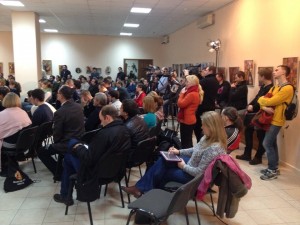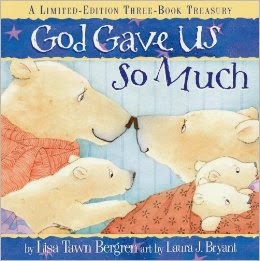E-book Freebies, a Christian View on Pot, the Wild (Middle) East, US Evangelicals Becoming More Anti-Israel and Pro-Palestinian Are This Week's Websightings
What Do You Think of Me? Why Do I Care?: Answers to the Big Questions of Life [Kindle Edition]
Edward T. Welch (Author)
1/22/14 update: now $2.51
4.7 out of 5 stars See all reviews (16 customer reviews)
161 pages Kindle price – free for a limited time
Save $12.99
Was Free on Kindle and Vyrso for a limited time
1/22/14 update: now $4.39
As a young woman from a deeply flawed family, Ashley had little hope she would amount to anything. If there was trouble, near or far, she found it. Yet, in her destructive days of drugs, alcohol, and sex, she encountered a forgiving God who was relentlessly faithful.
Change did not come quickly. The brokenness did not disappear. But little by little, Ashley allowed God to heal her, to transform her desires, to bring courage to others through her journey. Little by little, she saw that it was her brokenness itself that God wanted to use.
This beautifully told story will take you from the back rooms of Nashville to the churches of the San Francisco Bay area to a tender new life where one woman discovers that God can work in broken places.
1/22/14 update: now $4.39
As a young woman from a deeply flawed family, Ashley had little hope she would amount to anything. If there was trouble, near or far, she found it. Yet, in her destructive days of drugs, alcohol, and sex, she encountered a forgiving God who was relentlessly faithful.
Change did not come quickly. The brokenness did not disappear. But little by little, Ashley allowed God to heal her, to transform her desires, to bring courage to others through her journey. Little by little, she saw that it was her brokenness itself that God wanted to use.
This beautifully told story will take you from the back rooms of Nashville to the churches of the San Francisco Bay area to a tender new life where one woman discovers that God can work in broken places.
This opinion is from October of 2013 but I just found it and I think it is worth considering
Anti-protest laws to hurt Christians
Anti-protest laws to hurt Christians
Ukraine (MNN) — “Welcome back to the USSR, to Stalin regime, to 1937.” That’s Michael Cherenkoff with Russian Ministries talking about sweeping anti-protest laws passed in Ukraine that will ultimately affect Christian work.
Late last week, the Ukrainian majority government forced through legislation that not only puts an end to anti-government protests, but also puts pressure on non-governmental organizations who receive funding from outside Ukraine. That includes development organizations and mission groups, many of which left Russia and are now headquartered in Ukraine because of religious freedom.
That’s now over.
Late last week, the Ukrainian majority government forced through legislation that not only puts an end to anti-government protests, but also puts pressure on non-governmental organizations who receive funding from outside Ukraine. That includes development organizations and mission groups, many of which left Russia and are now headquartered in Ukraine because of religious freedom.
That’s now over.
According to Cherenkoff, organizations receiving money from abroad would be deemed foreign agents. “It’s much like Russia’s laws, but much worse.”
Palestinian Campaign to Woo US Evangelicals
Published: Monday, October 28, 2013 7:47 AM
Published: Monday, October 28, 2013 7:47 AM
“To my knowledge, there are no broad-based Evangelical leaders in the U.S. who will speak out about this problem, which is developing into an epidemic. Victor Styrsky, Eastern Regional Coordinator for Christians United for Israel (CUFI) said to me in 2012: ‘If something isn’t done soon, in 10 years, pro-Israel support among American Evangelicals will all be over.’ The way things are going, support will completely flip from Israel to the Palestinians in the next generation. The so-called ‘Christian Palestinianists’ are currently way ahead of Christian Zionists in the propaganda wars.”
Region Boiling, Israel Takes Up Castle Strategy
By JODI RUDOREN
Region Boiling, Israel Takes Up Castle Strategy
By JODI RUDOREN
JAN. 18, 2014
Since the Arab Spring uprisings began in 2011, there have been two main schools of thought in Israel. One argues that the instability in the region makes resolving the Palestinian conflict all the more urgent, to provide a beacon on an uncertain sea. The other cautions against making any concessions close to home while the future of the neighborhood remains unclear. The camps have only hardened their positions in response to the recent developments.
My note: the wait and see attitude seems to run along the strategy of allowing Sunnis and Shiites to weaken each other in battles vs. each other.
The article states, “Efraim Halevy, a former director of Israel’s Mossad intelligence agency, views the landscape differently. Iran’s involvement in Syria and Iraq could distract it from its nuclear project, he said. Hezbollah has lost fighters in Syria and faced setbacks in its standing at home in Lebanon. Hamas, the Palestinian militant faction that controls the Gaza Strip, has been severely weakened by the new military-backed government in Egypt and its crackdown on the Muslim Brotherhood. Syria’s military capacity has been greatly diminished.”
Moral and Biblical Thoughts about Marijuana
By Jim Daly
What is your view on the use of marijuana?
Question on the Focus on the Family website
Since the Arab Spring uprisings began in 2011, there have been two main schools of thought in Israel. One argues that the instability in the region makes resolving the Palestinian conflict all the more urgent, to provide a beacon on an uncertain sea. The other cautions against making any concessions close to home while the future of the neighborhood remains unclear. The camps have only hardened their positions in response to the recent developments.
My note: the wait and see attitude seems to run along the strategy of allowing Sunnis and Shiites to weaken each other in battles vs. each other.
The article states, “Efraim Halevy, a former director of Israel’s Mossad intelligence agency, views the landscape differently. Iran’s involvement in Syria and Iraq could distract it from its nuclear project, he said. Hezbollah has lost fighters in Syria and faced setbacks in its standing at home in Lebanon. Hamas, the Palestinian militant faction that controls the Gaza Strip, has been severely weakened by the new military-backed government in Egypt and its crackdown on the Muslim Brotherhood. Syria’s military capacity has been greatly diminished.”
Moral and Biblical Thoughts about Marijuana
By Jim Daly
What is your view on the use of marijuana?
Question on the Focus on the Family website





Comments
Post a Comment